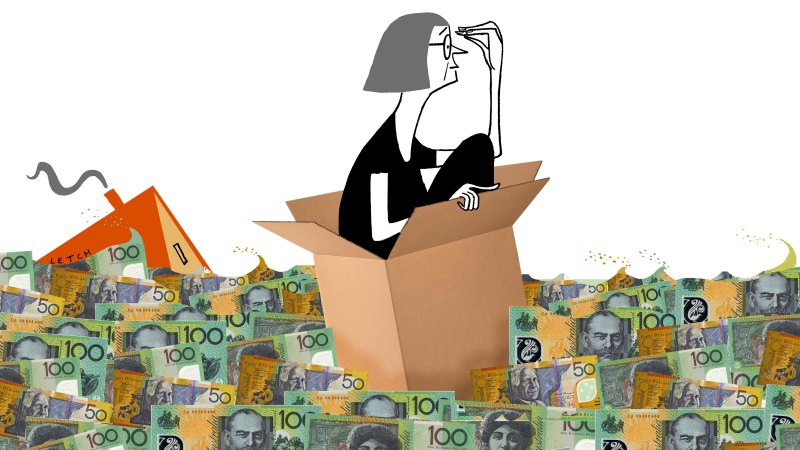
Should I sell my family home to top up my super?
December 13, 2022I am 73, single, and about to sell my home to, among other reasons, release some liquid capital as I have under $100,000 in super. My home will probably sell for about $1 million. Should I deposit $300,000 into my super as a downsizer contribution? Is there any advantage to doing this?
You could add $300,000 to your super under the downsizing rules, but by selling your home you’re converting an exempt asset (the family home) to assessable assets, and this may adversely impact your age pension. I appreciate there may be many valid reasons to sell, and these could include maintenance or unsuitability as a place to live as you age, but you could also consider a small reverse mortgage against the house which would give you capital and allow you to stay living in the property.
By selling your home you’re converting an exempt asset (the family home) to assessable assets, which may adversely impact your age pension.Credit:Simon Letch
For example, the government Home Equity Access Scheme allows you to borrow at a 3.95 per cent variable rate. There is also the issue of where you will live when you sell the house and what that would cost. They’re all major issues to be given great thought.
My 16-year-old daughter works part-time at Coles, and earns tiny amounts of superannuation but pays no tax. Is there any reason we shouldn’t contribute $1000 of after-tax income into her super fund to get the $500 government co-contribution? I’m well aware that normally she shouldn’t be topping up super at such a young age, but the 50 per cent return on the first year’s investment seems too good to pass up. The only negative I can see is the tiny effort of her doing a tax return.
I think it’s a fantastic idea, and the benefits far exceed the 50 per cent return you will get on your money. She will get involved with the mechanics of superannuation from an early age, and this will include choosing the appropriate asset allocation, and whether she needs insurance or not. Furthermore, preparing a tax return will give her an education that most 16-year-olds have never had. Congratulations on being a great parent.
My husband, aged 69, and I, aged 68, are self-funded retirees. Both our super funds are still in accumulation phase. We are living off our savings. We intend to sell our debt-free home and buy another home, and we would like to buy before selling. To enable this we would each have to withdraw $300,000 from our super accounts as well as use cash savings. Can we put the funds totalling $600,000 back into each of our super accounts once we have funds from selling our existing home? Our present superannuation balances are $490,000 and $390,000 respectively. We don’t intend to take advantage of the downsizer rules.
You have reached an age where you can withdraw superannuation tax-free on demand and may contribute non-concessional contributions to super up to age 75 provided your superannuation balances do not exceed $1.7 million. Selling the old property before you buy the new one is a wise move in this market of fluctuating property prices. You want to avoid committing to a new property until you are certain of the price you can get for your existing one.
Provided you have not utilised the bring-forward rules in the last three years you should be able to contribute up to $330,000 each as non-concessional contributions. I think it’s wise not to use the downsizer contribution – better to keep that for a time when you are over the superannuation age limit. The downsizer contribution has no age limit.
My wife and I are self-funded retirees. I applied for the CSHC after the income limit was lifted and have been approved. The process was a little onerous but worth the effort. I’ve told some of my friends, however they are reluctant to go through the process partly because they find the income test confusing. Would you be able to spell out the income test in a simple fashion to help all my fellow Australians who are hesitating about applying?
The CSHC is not asset tested, but you must be of pensionable age to apply. To meet the income test, you must earn less than the following: $90,000 a year if you’re single, $144,000 a year for couples or $180,000 a year for couples separated by illness, respite care or prison.
The income test is based on the sum of your adjusted taxable income plus the deemed value of money in superannuation from which you are drawing a pension. There is a deeming calculator on my website. The deemed value for CSHC purposes for a couple with $3.4 million in pension mode in superannuation is $74,628 a year. This means a couple could earn a further $69,372 before losing eligibility.
- Advice given in this article is general in nature and is not intended to influence readers’ decisions about investing or financial products. Investors should always seek their own professional advice that takes into account their own personal circumstances before making any financial decisions.
Noel Whittaker is the author of Retirement Made Simple and numerous other books on personal finance. Email: [email protected]
More from Money: How to grow and keep your wealth
- It would be great if the rules of superannuation were simple – but they’re not, and retirees often get confused believing that all withdrawals from super are tax-free. This is how to make your taxable superannuation component tax-free.
- Noel Whittaker answers a reader’s question: Can superannuation be passed onto children tax-free after death? And how do adult children qualify for being considered financially dependent?
- Want to increase your superannuation balance? The rules of superannuation are complex – but this is how best to make additional superannuation contributions before you turn 75.
Most Viewed in Money
From our partners
Source: Read Full Article



